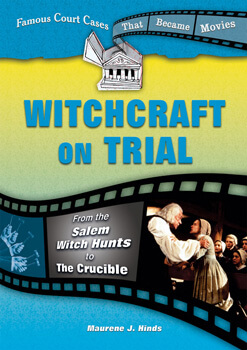
Witchcraft on Trial
In 1692, in Salem, Massachusetts, a group of girls accused several people of the town of being witches. A series of trials ensued, leading to guilty verdicts and the execution of twenty villagers. The events have fascinated people for three centuries, leading to debate, speculation, and historical investigation. In The Crucible, famed playwright Arthur Miller wrote about that time, using the events in Salem to reflect the symbolic witch hunts of 1950s America. This book compares the historical events with the movie made from the play to help readers understand what happened and why.
* Reviews *
Books about notable court cases are nothing new, but the inclusion of movies inspired by them is an alluring twist. These authors explain complex issues in an easy-to-follow manner. They provide background to each trial and explain how it unfolded and why it remains significant. For example, Racism states that Medgar Evers's murder "[confronted] the public with the necessity for improvements in racial relationships." The movie aspect might be gimmicky, but it works. A popular cultural phenomenon is woven seamlessly into the texts to attract readers. Clear photographs in full color and black and white appear in 35mm film-like frames, adding visual appeal. Sources are well-documented, making this series a promising staple for reports., School Library Journal April 2009










